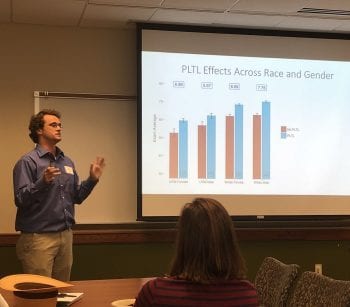 This workshop presented data on four recent interventions in STEM courses at WashU and encouraged participants to discuss the implications for their own teaching. The four interventions are outlined below and include links to references and websites with further information:
This workshop presented data on four recent interventions in STEM courses at WashU and encouraged participants to discuss the implications for their own teaching. The four interventions are outlined below and include links to references and websites with further information:
- Re-quizzing Students in an Introductory Biology Course
- Exam Wrappers in Psychology Courses
- Peer-led Team Learning (PLTL) across Student Characteristics and Time
- Social Belonging Intervention in STEM Courses
Re-quizzing Students in an Introductory Biology Course
Presented by: Elise Walck-Shannon
The goal of this project was to increase structure within the course by introducing re-quizzing as a formative assessment, or an assessment used to monitor the progress of students’ learning. By giving this type of assessment, it allowed the instructor to evaluate if the students are well-aligned to expectations and provides an opportunity to make adjustments if not aligned. It was found that in an introductory Biology course at WashU, there were benefits to re-quizzing students when controlling for preparation and it may be a particularly helpful tool for assisting students who have previously struggled with coursework in a similar format (however, the same students were not as likely to take advantage of this low-stakes assignment).
Resources Related to Re-quizzing:
- Five Types of Quizzes that Deepen Engagement with Course Content: Faculty Focus
- Hinze and Rapp (2014): Retrieval (Sometimes) Enhances Learning: Performance Pressure Reduces the Benefits of Retrieval Practice
- Trumbo et al. (2016): Effects of Reinforcement on Test-Enhanced Learning in a Large, Diverse Introductory Psychology Course
- Butler and Roediger (2008): Feedback enhances the positive effects and reduces the negative effects of multiple-choice testing
Exam Wrappers in Psychology Courses
Presented by: Shaina Rowell
Previous research has shown that students can benefit from guidance on how to overcome obstacles related to studying. Exam wrappers are short assignments given to students after reviewing previous exams that encourages students to formulate specific strategies for improving future exam performance. Results from the intervention suggested that in both introductory and upper-level psychology courses, exam wrappers can be a useful tool when students include specific, actionable plans they can follow through on.
Further Resources on Exam Wrappers:
- Carnegie Mellon University’s Eberly Center- Exam Wrappers
- Lovett (2013): Make Exams Worth More Than the Grade- Using Exam Wrappers to Promote Metacognition
- Chen, Chaves, Ong and Gunderson (2017): Strategic Resource Use for Learning: A Self-Administered Intervention That Guides Self-Reflection on Effective Resource Use Enhances Academic Performance
Examining Peer-led Team Learning (PLTL) Across Student Characteristics and Time
Presented by: Mike Cahill
PLTL has been shown to be an effective tool for students to improve learning in introductory STEM courses, but it appears to affect some groups of students differently. We discussed PLTL data from the past five years at WashU, in which we examined differences in exam performance based on race and gender and the interaction of these variables with PLTL.
Resources for WashU PLTL:
- Overview of PLTL at WashU
- Specific Programs:
- Frey et al. (2018): Peer-Led Team Learning in General Chemistry I: Interactions with Identity, Academic Preparation, and a Course-Based Intervention
- Sawyer et al. (2014): Peer-Led Team Learning in General Chemistry
- Hockings et al. (2008): Peer-Led Team Learning in General Chemistry: Implementation and Evaluation
Social Belonging
Presented by: Angela Fink
For students, feeling that one belongs in college and in one’s major plays an important role in the transition from high school to college. Previous research has suggested that reducing belonging uncertainty in college students may improve student performance and retention. In this session, we presented data on the survey-based social belonging study conducted at WashU in introductory chemistry courses.
Research on Social Belonging:
- Psychology in Action- The Power of Social Belonging
- Walton and Cohen (2007): A Question of Belonging- Race, Social Fit and Achievement
- Walton and Cohen (2011): A Brief Social-Belonging Intervention Improves Academic and Health Outcomes of Minority Students
- Walton et al. (2015): Two Brief Interventions to Mitigate a “Chilly Climate” Transform Women’s Experience, Relationships and Achievement in Engineering